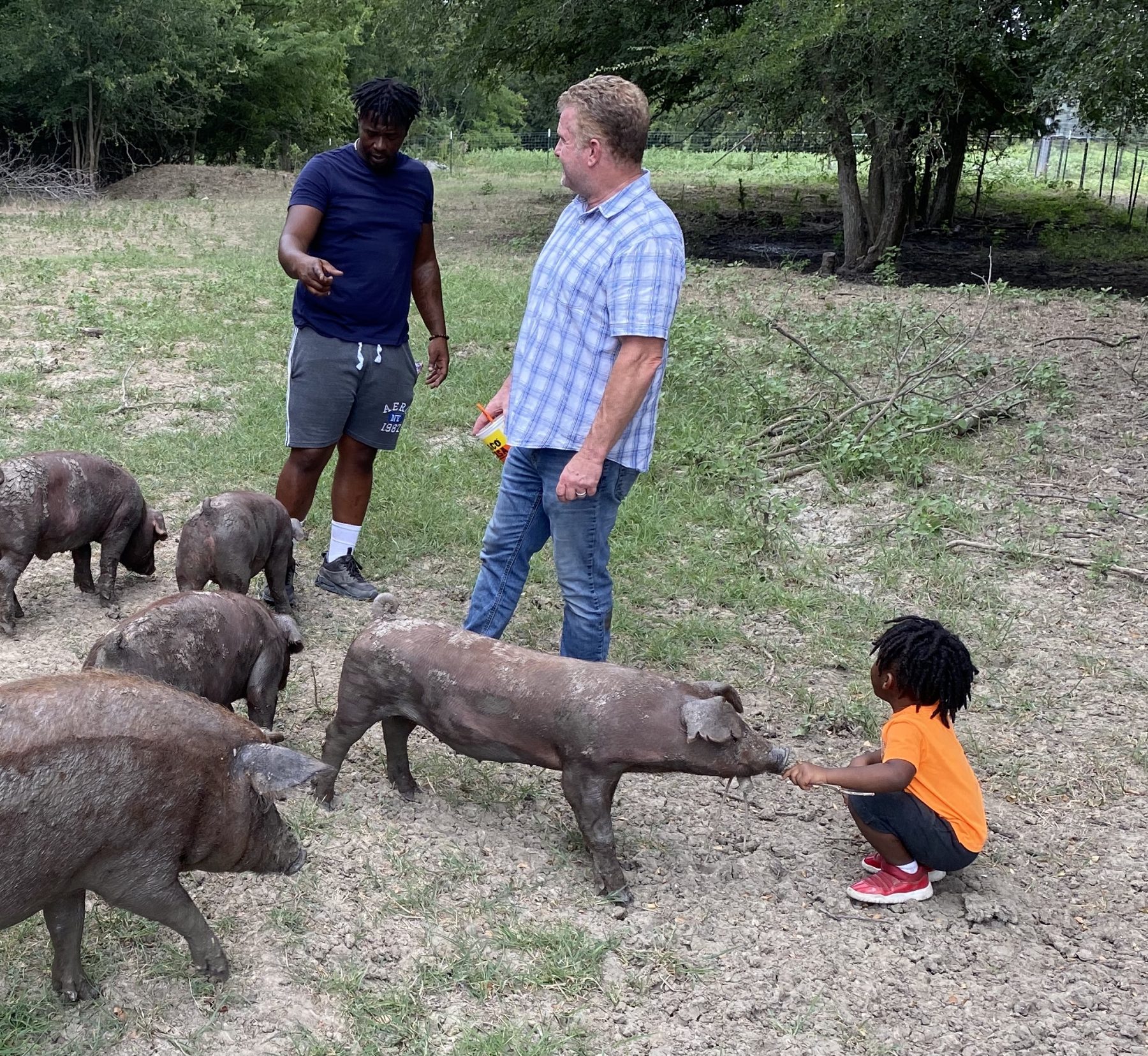
Quincy Bradley, Daron Babcock, and “Q the Younger” at Bonton Farms’ Extension this summer.
Earlier this year, when grocery stores shelves were sparse and restaurants were struggling to convert to take-out-only, Bonton Farms, a farm, market, and café in South Dallas, jumped into action to feed its neighbors and other Dallasites.
“Times are changing and so are we,” a March 2020 post on the Bonton Farms Facebook account read. “One thing that hasn’t changed is people need to eat.”
COVID-19 unfolded as I was reporting a story about Bonton Farms for the December 2020 issue of Texas Highways. I got to witness first-hand how this business, which you can get a primer on in my article, handled the pandemic speedily and carefully.
Instead of having customers shop at the farms for the produce, protein, and other fresh goods, the staff figured out a system to offer curbside pickup and delivery within a 10-mile radius. Among the first offerings were butter bib lettuce, spring onions, collards, carrots, eggs, housemade Swiss chard and potato soup, and grass-fed chuck roast and ground beef from a Panhandle ranch. Late spring brought the arrival of other specialties like rare varieties of beets. In the summer, squash, gourmet peppers, mini-cucumbers, tomatoes, eggplant, okra, and fresh herbs sustained customers. Some of this produce was so sublime and unique that they couldn’t have possibly been found on supermarket shelves, even before COVID-19.
Like many restaurants, the café, a major part of the farm’s operations, closed completely. Bonton Farms owners, Daron and Theda Babcock, reassigned café staff to other duties in order for employees at keep their jobs. When the café eventually reopened for curbside takeout (and later patio dining), popular menu items like the Yardbird & Grits (with moist charbroiled chicken drumsticks and thighs), fried catfish with collards, breakfast tacos, and the Mater Sandwich with fried green tomatoes, pimento cheese, and sourdough provided additional comfort and nourishment. “Fried green tomatoes are something that are very familiar to the community, so we wanted to make it a menu item instead of a side,” Theda says. The tomatoes are dipped in buttermilk and dredged in housemade cornmeal before frying in a mix of canola and olive oils. “It’s the best sandwich I ever had that somebody else made,” my wife, Eileen, says.

Chicken packaged to-go from the café’s popular Yardbird & Grits dish.
Even the employees at Bonton Farms are slowly getting back to normal. Quincy Bradley, a gardener who I met at the farm’s 40-acre extension on the outskirts of southeast Dallas, is having better luck with his crop. He’s currently growing arugula, brussels sprouts, mustards, collards, three varieties of lettuce, multiple herbs, Swiss chard, and cabbage. “It’s more food than I thought could grow in that space,” he says. I spent some time with him and his four-year-old son Quincy, who was introduced as “Little Q,” but he insisted he wasn’t “little.” I anointed him “Q the Younger” as we mingled with hogs, goats and chickens, and livestock nibbled at his extended hand. He beamed.
Supermarkets in Dallas are better stocked now than at the pandemic’s outset, but their inventory doesn’t match Bradley’s—and his fellow farmers’—offerings in variety, freshness, and nutrition. That’s a boon to Bonton residents, who previously had to rely on overpriced processed food sold at neighbor convenience stores.
For my wife and I, driving 20 miles to Bonton Farms is well worth it for superb groceries and a to-go Mater Sandwich.








